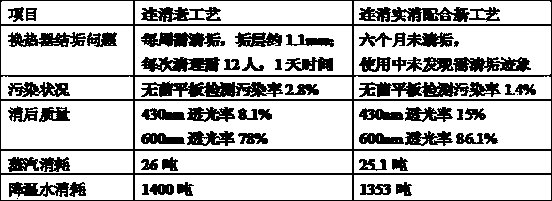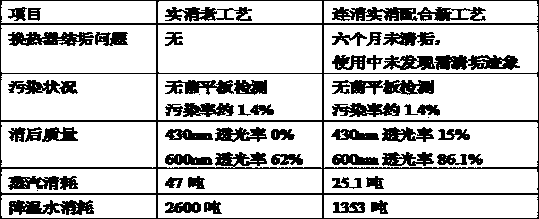Material sterilization method integrating continuous sterilization and filled can sterilization in lysine fermentation process
A technology of lysine fermentation and sterilization method, which is applied in the field of medium sterilization technology, can solve the problems of large medium damage, high energy consumption, heat exchanger fouling, etc., and achieve the goal of overcoming the destruction of medium and energy High consumption, the effect of solving scaling
- Summary
- Abstract
- Description
- Claims
- Application Information
AI Technical Summary
Problems solved by technology
Method used
Image
Examples
Embodiment 1
[0022] Example 1 The material sterilization method of combining Lianshixiao in lysine fermentation
[0023] (1) Fermentation medium composition: corn steep liquor, glucose, phosphoric acid, magnesium sulfate, potassium chloride and soybean meal hydrolyzate (specifically, the weight ratio of each component of the fermentation medium to the total fermentation material is: corn steep liquor 2%, glucose 10-12%, potassium dihydrogen phosphate 0.3-0.4%, magnesium sulfate 0.3-0.4%, soybean meal hydrolyzate 2%, ammonium sulfate 3%.
[0024] (2) Real consumption: mix corn steep liquor, dipotassium hydrogen phosphate, soybean meal hydrolyzate, and ammonium sulfate in the fermentation medium, add ingredient water, control the volume to 15% of the total fermentation material volume, and put it into the fermentation tank. Raise the temperature to 121°C with steam from the bottom and keep it for 50 minutes;
[0025] (3) Continuous elimination: mix glucose and magnesium sulfate, add ingredi...
Embodiment 2
[0027] Example 2 The material sterilization method of combining Lianshi Xiaoxiao in lysine fermentation
[0028] 1. Composition of fermentation medium:
[0029] Corn steep liquor 2%, glucose 10-12%, potassium dihydrogen phosphate 0.3-0.4%, magnesium sulfate 0.3-0.4%, soybean meal hydrolyzate 2%, ammonium sulfate 3%.
[0030] 2. Mix corn steep liquor, potassium dihydrogen phosphate, soybean meal hydrolyzate, and ammonium sulfate, and put them directly into the tank to be sterilized, and add ingredient water to make the volume reach 15% of the total volume.
[0031] 3. The fermenter (including the mixture of 2 steps) is heated from the bottom by steam, so that the temperature reaches 120°C--123°C, and keeps for 40-60 minutes.
[0032] 4. Mix other components except the medium material in step 2 together, and add batching water to make up the volume, raise the temperature to 125°C-128°C through the continuous elimination device, maintain the temperature in the tank for 8-10 minu...
PUM
 Login to View More
Login to View More Abstract
Description
Claims
Application Information
 Login to View More
Login to View More - R&D
- Intellectual Property
- Life Sciences
- Materials
- Tech Scout
- Unparalleled Data Quality
- Higher Quality Content
- 60% Fewer Hallucinations
Browse by: Latest US Patents, China's latest patents, Technical Efficacy Thesaurus, Application Domain, Technology Topic, Popular Technical Reports.
© 2025 PatSnap. All rights reserved.Legal|Privacy policy|Modern Slavery Act Transparency Statement|Sitemap|About US| Contact US: help@patsnap.com


